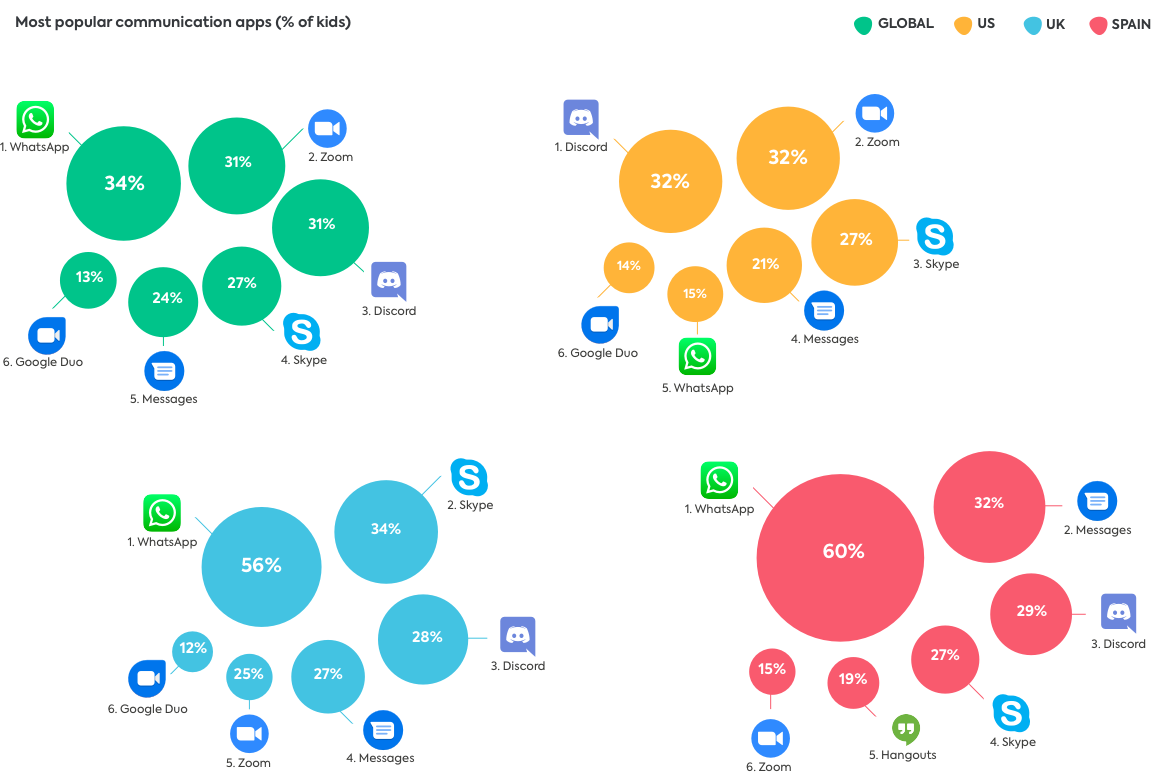RESEARCH BY APP CATEGORY
Communication

What we found for commnication apps
With the UK entering their third national lockdown on January 6, and schools remaining closed until March, it should come as no surprise that 2021 was, once again, a year for communication to shine. Across all five categories analyzed in our report, children increased their time most on communication apps, using these tools not just as a way to stay in touch with friends and family, but as a way to keep up with their schooling, messaging classmates about homework, and using video communications apps as part of their remote learning schedule. Overall, kids in 2021 spent 28% longer using communications apps to make video calls, send messages, and socialize with friends and family online.
For the third year in a row, Discord, once home to gamers and the alt-right, experienced a rise in popularity in 2021. From just 13% of kids using the app in 2019, 31% of children now choose Discord to connect online in many different ways, from chatting with friends and video messaging to forming study groups and sharing school notes.
THE MOST POPULAR COMMUNICATION APPS
While WhatsApp topped the popularity charts globally (34% of kids), and in the UK (56%) and Spain (60%), it only just made an appearance in the top 5 in the US, coming in fifth place with 15% of kids using the app. Kids in the US preferred to use Google’s Messages, with 22% of children choosing it to send and receive SMS. In the US, Discord was the leader of the pack for the very first time since our annual analysis began, with 32% of children in the country using the app.
Video conferencing apps Zoom and Skype also experienced an increase in popularity this year, on a global basis and in every country analyzed except Spain. Globally, Skype increased in popularity by 7% across 2021 (27%), and Zoom claimed joint second position in the rankings, tying with Discord at 31%. In Spain, children turned to messaging apps rather than video conferencing tools as their preferred communication method: both WhatsApp (60%) and Messages (32%) increased in popularity over 2021.



HOW MUCH TIME DID CHILDREN SPEND ON COMMUNICATION APPS IN 2021?
Video conferencing app Zoom, propelled to new heights in 2020 by the pandemic, showed no signs of stopping in 2021. Globally, and in each of the 3 countries we explored in our report, children spent more time on Zoom than on any other communications app, averaging 63/mins a day worldwide, up 26% from 2020.
In the US and UK, Discord held the second place title, with kids spending 38 mins/day and 32 mins/day on the app respectively. While children in Europe preferred to dedicate their messaging time to WhatsApp, with Spanish children spending 41 mins/day and UK kids devoting 29 mins/day overall, Messages was the app of choice in the US, where kids spent 24/mins a day sending and receiving messages.
Time on communication apps was overall higher in the first half of the year in the US and UK. In the UK, the downward curve during spring reflects many children’s return to school, while in the US, the decline in use was steadier over the year. In Spain, where children remained in school – with the exception of occasional class quarantines – for the majority of the year, communication levels remained relatively stable.
Children in all countries analyzed increased their time on communications apps over 2021, from just a 3% increase in Spain, up to 26% in the US, where kids spent 10 extra minutes on communication apps over the year, compared to 2020.




THE MOST BLOCKED COMMUNICATION APPS IN 2021
Reflecting Skype’s slight rise in the kids popularity charts, it rose to number 3 on the block list worldwide. Globally and in the US, families primarily chose to block Discord, connected to online predation and sexual exploitation in the past. In the UK and Spain, WhatsApp, under scrutiny for its data privacy policies, remained the number one blocked app for the second year in a row.
THE MOST BLOCKED COMMUNICATION APPS IN 2021
Despite Skype’s slight fall from grace in the kids popularity charts, it remained number 4 on the block list worldwide. Globally and in the US, despite Zoom’s popularity, parents primarily chose to block Discord, which has been connected to online predation and sexual exploitation in the past. In the UK and Spain, WhatsApp, under scrutiny for its data privacy policies, remained the app of choice for parents to block.

What we expect for communication apps
The line separating messaging apps from social media networks will grow smaller, with more and more users turning to messaging apps as a way to spread and share content.
In turn, as messaging and communication apps become more general multitaskers, they may, just as with social networks, become less of a safe space for children online, giving rise to the development of more child-friendly communication apps, as seen with Facebook’s Messenger Kids.
With communications apps now playing a huge role in education, due to the rise in popularity of video conferencing as a tool in remote learning, we anticipate that these tools will begin to focus on enhancements that boost productivity and engage users. Video conferencing tools will become much more than a space to make calls, encouraging file sharing, note taking, and other collaborative tasks to both enhance the business experience in the workplace, and the learning experience for educators and students.
What we recommend for communication apps
Whether for school, for quick check-ins from mom and dad throughout the day, or for chatting with close friends, communication is necessary. As social beings, it’s important for kids to also be able to keep in touch with family and friends. While for many, communication apps were a wellbeing lifeline during the pandemic, helping us connect with the people we love, for some children with geographic or mobility restrictions, technology is the only means they have to keep in touch with those closest to them.
In addition, communication apps are now an integral part of distance learning, and while for elementary, middle and high school students, remote learning may become less prevalent after 2021, online forms of communication will form a key part of life when it comes to college, the workplace, and beyond. Communication tools can also be a lifeline when working on collaborative projects, or checking in with other students for help and advice.
As communications apps rise in popularity, and children spend increased time talking to others online, keeping them safe and secure in the process should also be a priority. Just as with online gaming and social media, children should be careful not to reveal too much information about themselves online, limiting contacts to friends and family members.
While the importance of communication apps is undeniable, balance is key. Notifications and calls throughout the day can be a distraction, preventing kids from focusing on schoolwork or studying. To help kids keep their minds on the important tasks, we’d recommend scheduling screen-free, or cell phone-free hours, where they can’t be interrupted by the background noise of group chats and video calls. In addition to helping them focus, a break from connectivity can be beneficial for all members of the family – giving everyone time to connect through disconnection, getting outdoors and enjoying the fresh air.